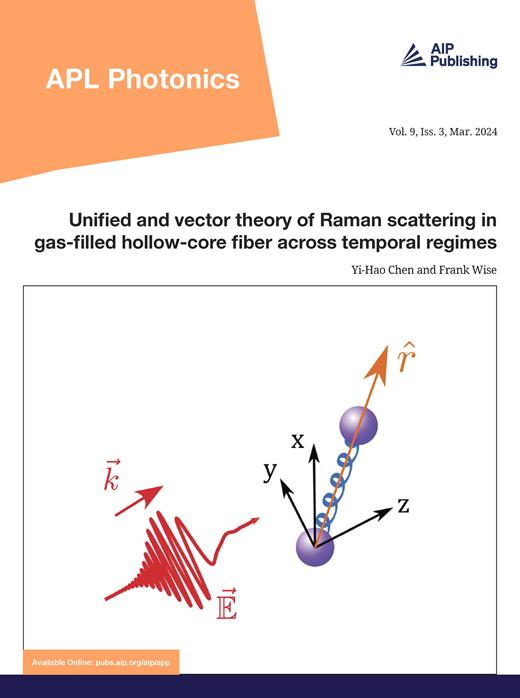Frequency combs induced by optical feedback and harmonic order tunability in quantum cascade lasers
IF 5.4
1区 物理与天体物理
Q1 OPTICS
引用次数: 0
Abstract
This study investigates the interaction between frequency combs and optical feedback effects in Quantum Cascade Lasers (QCLs). The theoretical analysis reveals new phenomena arising from the interplay between comb generation and feedback. By considering the bias current corresponding to free-running single mode emission, the introduction of optical feedback can trigger the generation of frequency combs, including both fundamental and harmonic combs. This presents opportunities to extend the comb region and generate harmonic frequency combs with different orders through optimization of external cavity parameters, such as losses and length. Furthermore, this study demonstrates that optical feedback can selectively tune the harmonic order of a pre-existing free-running comb by adjusting the external cavity length, particularly for feedback ratios around 1%, which are readily achievable in experimental setups. Under strong feedback conditions (Acket parameter C > 4.6), mixed states emerge, displaying the features of both laser and external cavity dynamics. While this study is predominantly centered on terahertz QCLs, we have also confirmed that the described phenomena occur when utilizing mid-infrared QCL parameters. This work establishes a connection between comb technology and the utilization of optical feedback, providing new avenues for exploration and advancement in the field. In fact, the novel reported phenomena open a pathway toward new methodologies across various domains, such as the design of tunable comb sources, hyperspectral imaging, multi-mode coherent sensing, and multi-channel communication.量子级联激光器中由光反馈和谐波阶数可调谐引起的频率梳
本文研究了量子级联激光器中频率梳和光反馈效应之间的相互作用。理论分析揭示了梳状产生与反馈相互作用产生的新现象。通过考虑自由运行单模发射对应的偏置电流,引入光反馈可以触发频率梳的产生,包括基频梳和谐波梳。这为通过优化损耗和长度等外腔参数来扩展梳域和生成不同阶次的谐波频率梳提供了机会。此外,该研究表明,光反馈可以通过调节外腔长度来选择性地调整预先存在的自由运行梳的谐波顺序,特别是当反馈比在1%左右时,这在实验装置中很容易实现。在强反馈条件下(ket参数C >4.6),出现混合态,表现出激光和外腔动力学的双重特征。虽然这项研究主要集中在太赫兹QCL上,但我们也证实了当使用中红外QCL参数时,所描述的现象会发生。这项工作建立了梳状技术和光反馈利用之间的联系,为该领域的探索和进步提供了新的途径。事实上,新报道的现象为跨各个领域的新方法开辟了一条道路,例如可调谐梳状源的设计、高光谱成像、多模相干传感和多通道通信。
本文章由计算机程序翻译,如有差异,请以英文原文为准。
求助全文
约1分钟内获得全文
求助全文
来源期刊

APL Photonics
Physics and Astronomy-Atomic and Molecular Physics, and Optics
CiteScore
10.30
自引率
3.60%
发文量
107
审稿时长
19 weeks
期刊介绍:
APL Photonics is the new dedicated home for open access multidisciplinary research from and for the photonics community. The journal publishes fundamental and applied results that significantly advance the knowledge in photonics across physics, chemistry, biology and materials science.
 求助内容:
求助内容: 应助结果提醒方式:
应助结果提醒方式:


